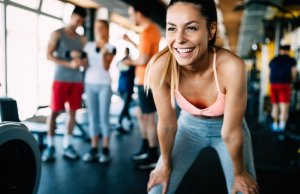Sports Nutrition: how it affects your performance

Do you place enough importance on sports nutrition? It’s often neglected by athletes, and as you’ll see, it’s absolutely essential to meeting your goals.
All athletes want to improve their performance. In fact, optimal performance is the only way to get the results you want and ensure that you’re exercising efficiently.
Usually, people think that the best way to improve their performance is to train more and more. They believe this is the way to increase endurance and therefore optimize their performance. The reality is that sports nutrition plays a fundamental role. As we’ve discussed on several occasions, sports and nutrition go hand in hand.
Sports nutrition: the importance of carbohydrates
Carbohydrates are one of the most important nutrients for athletes because they provide the energy needed for exercise. A lack of carbohydrates means your body will have less energy and thus grow tired more quickly and perform at a lower level.

This is why this kind of nutrient is a fundamental pillar of sports nutrition. The best part is that you can consume carbohydrates in a variety of ways, as they are found in a number of different foods. These include cereals, tubers, legumes, and dairy products.
As you can see, it’s very easy to consume carbohydrates throughout the day in order to accumulate energy. This will allow you to perform at your best when it comes time to exercise.
Stay hydrated
Proper sports nutrition involves more than just solid foods. You need to remember to stay well-hydrated. When we exercise, the amount of liquid we lose is much greater than when we are at rest. The culprit: sweat.
This is why it’s recommended that you drink about two liters of water per day. Distribute this amount evenly throughout the day, with a special emphasis on the periods before and after exercise. If you engage in intense exercise for a prolonged period of time, we recommend that you keep a water bottle handy to rehydrate you as you lose fluids.
If you find it hard to drink two liters of water a day, remember that you can also eat foods that are rich in water. Natural juices, melon, and watermelon are all good options.

Foods that promote recovery
The foods you eat right after exercising are highly important. Depending on the type of food you consume, you can get closer to achieving your goals. Conversely, poor nutritional choices after your workout can render your session useless.
In terms of sports nutrition, we recommend that after you finish your session, hydrate in as nutritious a way as possible. Eat foods that are rich in water and drink natural juices or drinks containing mineral salts.
No more than an hour later, you should eat carbohydrates and a small number of healthy fats. Your body is low in nutrients and needs to replenish its strength through healthy food.
Consistent schedules
Our last piece of sports nutrition advice has to do with your exercise and meal schedules. It is important to accustom your body to your routine and follow more or less stable schedules.

The results will come sooner and will be better if you always eat and exercise at the same times. Although this can be complicated, the effort is worth it. Your body will thank you.
Sports nutrition and performance go hand in hand. It’s impossible to achieve your goals if you neglect either. Remember to prioritize carbohydrates, stay hydrated, and stick to a stable meal and exercise schedule.
Do you place enough importance on sports nutrition? It’s often neglected by athletes, and as you’ll see, it’s absolutely essential to meeting your goals.
All athletes want to improve their performance. In fact, optimal performance is the only way to get the results you want and ensure that you’re exercising efficiently.
Usually, people think that the best way to improve their performance is to train more and more. They believe this is the way to increase endurance and therefore optimize their performance. The reality is that sports nutrition plays a fundamental role. As we’ve discussed on several occasions, sports and nutrition go hand in hand.
Sports nutrition: the importance of carbohydrates
Carbohydrates are one of the most important nutrients for athletes because they provide the energy needed for exercise. A lack of carbohydrates means your body will have less energy and thus grow tired more quickly and perform at a lower level.

This is why this kind of nutrient is a fundamental pillar of sports nutrition. The best part is that you can consume carbohydrates in a variety of ways, as they are found in a number of different foods. These include cereals, tubers, legumes, and dairy products.
As you can see, it’s very easy to consume carbohydrates throughout the day in order to accumulate energy. This will allow you to perform at your best when it comes time to exercise.
Stay hydrated
Proper sports nutrition involves more than just solid foods. You need to remember to stay well-hydrated. When we exercise, the amount of liquid we lose is much greater than when we are at rest. The culprit: sweat.
This is why it’s recommended that you drink about two liters of water per day. Distribute this amount evenly throughout the day, with a special emphasis on the periods before and after exercise. If you engage in intense exercise for a prolonged period of time, we recommend that you keep a water bottle handy to rehydrate you as you lose fluids.
If you find it hard to drink two liters of water a day, remember that you can also eat foods that are rich in water. Natural juices, melon, and watermelon are all good options.

Foods that promote recovery
The foods you eat right after exercising are highly important. Depending on the type of food you consume, you can get closer to achieving your goals. Conversely, poor nutritional choices after your workout can render your session useless.
In terms of sports nutrition, we recommend that after you finish your session, hydrate in as nutritious a way as possible. Eat foods that are rich in water and drink natural juices or drinks containing mineral salts.
No more than an hour later, you should eat carbohydrates and a small number of healthy fats. Your body is low in nutrients and needs to replenish its strength through healthy food.
Consistent schedules
Our last piece of sports nutrition advice has to do with your exercise and meal schedules. It is important to accustom your body to your routine and follow more or less stable schedules.

The results will come sooner and will be better if you always eat and exercise at the same times. Although this can be complicated, the effort is worth it. Your body will thank you.
Sports nutrition and performance go hand in hand. It’s impossible to achieve your goals if you neglect either. Remember to prioritize carbohydrates, stay hydrated, and stick to a stable meal and exercise schedule.
All cited sources were thoroughly reviewed by our team to ensure their quality, reliability, currency, and validity. The bibliography of this article was considered reliable and of academic or scientific accuracy.
- Burke, L. (2010). Nutrición en el deporte: Un enfoque práctico. Ed. Médica Panamericana.
- Guerra Hernández, Eduardo. (2016). Nutrición del deportista. Universidad de Granada. https://docplayer.es/25362394-Nutricion-del-deportista-eduardo-guerra-hernandez-dpto-de-nutricion-y-bromatologia-universidad-de-granada-espana.html
- Urdampilleta, A., Martínez-Sanz, J., Julia-Sanchez, S., & Álvarez-Herms, J. (2013). Protocolo de hidratación antes, durante y después de la actividad físico-deportiva. motricidad. Revista Europea del Movimiento Humano , 31 ( ), 57-76.
This text is provided for informational purposes only and does not replace consultation with a professional. If in doubt, consult your specialist.








